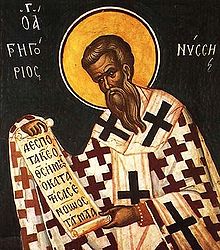

The Cappadocian Fathers, also traditionally known as the Three Cappadocians, were a trio of Byzantine Christian prelates, theologians and monks who helped shape both early Christianity and the monastic tradition. Basil the Great (330–379) was Bishop of Caesarea; Basil's younger brother Gregory of Nyssa (c. 335 – c. 395) was Bishop of Nyssa; and a close friend, Gregory of Nazianzus (329–389), became Patriarch of Constantinople.[1] The Cappadocia region, in modern-day Turkey, was an early site of Christian activity.
The Cappadocians advanced the development of early Christian theology, for example the doctrine of the Trinity,[2]: 22 and are highly respected as saints in both Western and Eastern churches.
- ^ "Commentary on Song of Songs; Letter on the Soul; Letter on Ascesis and the Monastic Life". World Digital Library. Retrieved 6 March 2013.
- ^ McGrath, Alister (1998), Historical Theology, Oxford: Blackwell Publishers, ISBN 0-63120843-7